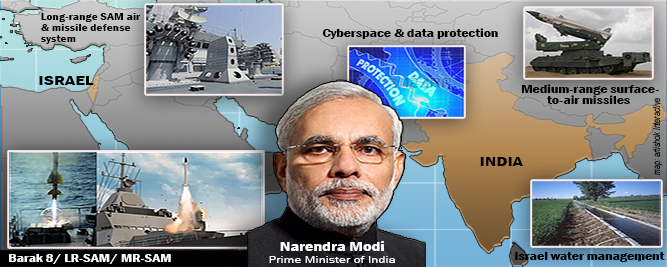
Narendra Modi’s three-day visit Israel on 4 July is imbued with symbolism, breathtaking benefits to the two countries and an era of promise for both. Its timing underlines the slow upswing in ties from years of aloofness to the establishment of diplomatic ties 25 years ago and the onset of flourishing relations ever since.
Modi stands out for Israel – not just as the first Indian prime minister to visit, but also as a prominent world leader willing to skip the Palestinian Authority in Ramallah, thereby removing the automatic bracket attached to most foreign visits. This gesture is appreciated in Israel no less than booming defense deals totaling more than $1 billion a year and the joint projects in water management, cyberspace, data protection, agricultural innovation, medicine, digitalization and numberless other fields with the world’s fastest growing major economy. Fighting terrorism and sustainable development are watchwords shared by one of the largest and one of the smallest Asian nations.
On the eve of his visit, the Indian leader spoke of Israel’s innovativeness, high technological attainments and economic success against all odds, in the face of few natural resources and decades of near-isolation. He saw his visit as a turning point for catapulting the two countries to new horizons.
Since Modi’s Bharatiya Janata Party stormed to power in 2014, New Delhi has signed more big-ticket defense deals than ever before for his program of updating his country’s Soviet-era military hardware to counter long-standing rivalry with China and Pakistan.
While Russia – followed by the United States in recent years – remains India’s top defense supplier, Israel is fast catching up. In April 2017, Israel Aerospace netted its biggest ever contract to supply the Indian armed forces with $2 billion worth of the groundbreaking Barak 8 Medium Range-Surface to Air Missiles as well as Long Range-Surface to Air Missiles for India’s warships and its first indigenous aircraft carrier, the Vikrant.
The two-way trade between the two countries amounting to $4.16 billion gives Israel a large surplus of $2.4 billion in exports compared with $1.7 billion of imported Indian products.
Prime Minister Modi will certainly want to discuss with Israel’s leaders ways to correct this imbalance. Many of the defense deals already signed include military components to be manufactured in plants established in India for this purpose. The two governments also work together in a joint industrial R&D fund which provides funding for industries carrying out bilateral research projects.
While computerized drip irrigation developed by Israel is gaining extensive use in India, New Delhi is also interested in the Israeli start-up ecosystem and incubation centers.
It was in a far-distant age, that Prime Minister Indira Ghandi authorized the Indian army to buy weapons from Israel during India’s 1971 war with Pakistan. But the sale had to go through Liechtenstein after Ghandi turned down Golda Meir’s request for India to recognize the fledgling Jewish state. It took 21 years and a new era for both countries to correct that omission..
While in Jerusalem, the Indian prime minister plans to visit the Yad Vashem Holocaust Memorial center. Touching a moment in past history, he will also pay his respects to the memory of the Indian soldiers who laid down their lives for the liberation of Haifa by the British army in 1918. From Jerusalem, Modi travels to Hamburg, Germany, for the G-20 summit beginning later this week.



India recently joined the Shanghai Cooperation Organization, along with Russia, China, PAKISTAN and others. It has also reached out to Japan, Vietnam and, of course, the US, besides Israel. Can Israel really rely on a relationship with a country like this, that rubs shoulders with everyone and their enemies? I don’t think so. Their reliationship with Israel, it seems, is like that between Walmart and its customers.